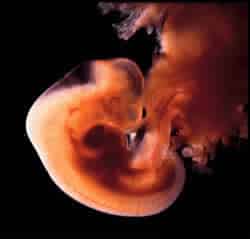
The researchers say that the women who suffer from multiple miscarriages have a womb that cannot differentiate between viable or good embryos and the not so good ones.
The research was conducted at a small level including six women who had suffered from recurrent miscarriages and six women with normal pregnancies.
High or low-quality embryos were placed in a channel created between two strips of the womb cells. In women with normal pregnancies the cells began to grow and reach towards the high quality embryo whereas low quality embryos were ignored.
The women who suffered from miscarriages had a womb where all embryos easily embedded regardless of the quality of the embryo.
Recurrent miscarriages affect one in 100 women in the UK. One expert not involved with the research said that it could help develop a test that could identify this condition in women.
Prof Nick Macklon, a consultant at the Princess Anne Hospital, said: “Many affected women feel guilty that they are simply rejecting their pregnancy. But we have discovered it may not be because they cannot carry, [but] it is because they may simply be super-fertile, as they allow embryos which would normally not survive to implant.”
He added, “When poorer embryos are allowed to implant, they may last long enough in cases of recurrent miscarriage to give a positive pregnancy test.”
Dr Siobhan Quenby, from the Royal College Obstetricians and Gynaecologists, said that this study was important as earlier it was believed that rejecting good embryos led to miscarriage, whereas the reason was quite the opposite.
“This theory is really quite attractive. It is lovely. It’s a really important paper that will change the way we think about implantation. It had been thought that rejecting normal embryos resulted in miscarriage, but what explains the clinical syndrome is that everything is being let in.”
She hoped that further research would help to detect if the receptiveness of these women could be altered so that they only had pregnancies that resulted in birth.






